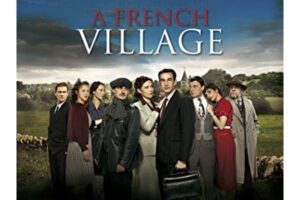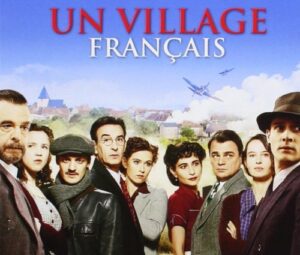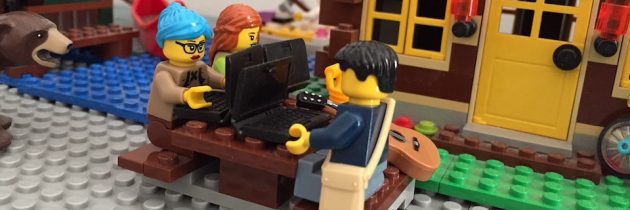A Historical Drama and a Master Class
Two months ago, my husband’s Italian friend and sociology professor colleague — the one with the identical twin girls — recommended a 10-year-old French historical TV series that was released with subtitles in the United States in 2018. Titled A French Village, it follows a fictional small town located in Occupied France across the river from the collaborationist Vichy Regime from June 1940, when the Nazis took over, to the years right after the war. Richard and I started watching at the end of September, and we’re now midway through the third of seven seasons, in the middle of 1942. We usually watch an episode a night. And while it’s probably not the best idea to watch a series about a town terrorized by a fascist occupation regime while we live in New York City during an election that will determine whether the United States remains a more-or-less functional democracy or, in the midst of a deadly pandemic, descends into a chaotic authoritarianism with a ruling party that hates liberal cities, we cannot turn away.
We are addicted.

As a writer of fiction who looks at other fictional creations to see how they work and what lessons I can apply to my own projects, I see A French Village and its addictive qualities as a master class. It’s most relevant to me because I write historical fiction; if you write fantasy, for instance, you may find Game of Thrones more relevant. And while the series is not without its flaws, including plot holes and retconning (creating new scenes that retroactively change established facts or interpretations), it stands out for creating complex characters that the viewer cares about and cliffhangers that leave those characters in physical and/or emotional danger.
Let’s talk about characters first. A good series has enough characters to explore events and relationships, and each of those characters has depth and complexity. Not enough characters, and there aren’t enough layers to the story, and if any of those principal characters dies or goes away, the story is poorer for their absence. While a couple of my favorite characters in A French Village haven’t made the transition from the second to the third season, the remaining ones are interesting enough to carry the story. In addition a fascinating new character has just arrived, a World War II-era Scheherazade whose talents as a fabulist add intrigue to the series while introducing an element of metafiction: the ability to tell a story and maintain the interest of the listener means survival for her…and for this series. (Readers of my reviews here and on The Pirate Tree may have already guessed that I’m a sucker for metafiction, defined as a story or elements within it that offer commentary on traditional narrative techniques.) At the same time, there aren’t too many characters, or characters so poorly differentiated from each other, that the audience loses track of them or doesn’t care enough about them to keep watching.
How does the writer differentiate characters in a large-enough cast to support a series? The writers of A French Village do so by giving each of the characters a clear desire line, a network of relationships, and complex dilemmas that show each one capable of, for instance, both great generosity and monstrous cruelty. Because they live under an occupation, they have to make compromises and even kindness has its cost. This is most clearly embodied in the character at the center of the story, village doctor Daniel Larcher who becomes the mayor after the original mayor flees the advancing German army. Right away, he delivers the baby of a Spanish refugee, but the mother doesn’t survive. Daniel’s wife Hortense, unable to have a child of her own, seeks to raise the child, but somewhere out there is a bereaved father. Will the Larchers — among the wealthiest villagers — give the child love and a better chance for a good life in the midst of wartime, or does the child belong with his refugee father? And what unethical arrangements will Daniel and Hortense make with the well-meaning but less-than-competent chief investigator for the police and his handsome, ambitious young underling with an attraction to older women? Everyone in A French Village is both a hero and a villain — even the children who the series writers don’t hesitate to place in horrific situations beginning with the very first episode.
 Besides their desires — mostly for love as they interpret it — the characters connect with viewers through their acts of kindness. Except for the German SS and Gestapo officials, there are no totally bad people. The overzealous young police investigator Jean Marchetti probably comes closest, and the filmmakers effectively juxtapose his good looks with his hard heart and manipulative personality. (Or maybe Marchetti is destined for moral greatness later in the series.) Caring for children and others who are vulnerable, helping Jews to escape the death camps, and risking their lives in the Resistance offer a measure of redemption to those who cheat on spouses or break up marriages. Viewers also see that being part of the Resistance, the “good guys,” comes with its own moral dilemmas, from not doing enough to save lives to executing informants before they denounce the entire group. This is a historically-accurate portrayal of a real Resistance and what it’s like to be part of one. A French Village shows us the potential, good and bad, of fundamentally decent but flawed people. At a time in our nation’s history in which we wonder about the fundamental decency of our neighbors and how their choices will affect those who are most vulnerable, this series carries additional resonance.
Besides their desires — mostly for love as they interpret it — the characters connect with viewers through their acts of kindness. Except for the German SS and Gestapo officials, there are no totally bad people. The overzealous young police investigator Jean Marchetti probably comes closest, and the filmmakers effectively juxtapose his good looks with his hard heart and manipulative personality. (Or maybe Marchetti is destined for moral greatness later in the series.) Caring for children and others who are vulnerable, helping Jews to escape the death camps, and risking their lives in the Resistance offer a measure of redemption to those who cheat on spouses or break up marriages. Viewers also see that being part of the Resistance, the “good guys,” comes with its own moral dilemmas, from not doing enough to save lives to executing informants before they denounce the entire group. This is a historically-accurate portrayal of a real Resistance and what it’s like to be part of one. A French Village shows us the potential, good and bad, of fundamentally decent but flawed people. At a time in our nation’s history in which we wonder about the fundamental decency of our neighbors and how their choices will affect those who are most vulnerable, this series carries additional resonance.
Once we’ve come to care about the characters in A French Village, the creators hook us with the cliffhanger. It can come in various forms, and the variety prevents it from being seen as manipulating the audience. Sometimes, it’s a physical threat — machine guns blazing at beloved characters who are running away. Sometimes, it’s a moral choice — a character faced with surrendering a desire or objective to prevent a greater harm. Sometimes, it’s a mystery, or a dreadful consequence about to happen. In many cases, the next episode doesn’t pick up in the middle of the cliffhanger but shows the resolution days, weeks, or months later, leaving the viewer to fill in the missing space. It’s a clever way of keeping the series moving forward and inviting the viewer into the story, imagining what happened in the interval and wondering what will happen next. Novelists, particularly for middle grade readers, are encouraged to end chapters on cliffhangers so young readers won’t put the book down and forget to pick it up again. This series is especially good at showing the kinds of cliffhangers that can be brought into play.
A final note: This series was created in France and presented with subtitles. We in the U.S. have long been indoctrinated into believing in the supremacy of our own film and TV industry, and, yes, Hollywood has had enormous impact on the world’s cultural output. However, our own cultural output has stagnated over the years, creativity subsumed to bean counters pushing stock characters and simple, recognizable tropes. We have lost the ability to fill in the white space, to question received orthodoxy, to think critically about our lives, relationships, and actions past and present. In a recent op-ed in The New York Times, Michelle Goldberg argues that the past four years, with its conflicts and atrocities, have not enriched our culture but rather have impoverished it, as a would-be dictator takes over more of our national headspace. I would say that our loss of cultural leadership predated the rise of Trumpism, contributed to that rise, and won’t be turned around until we recognize that we’re in dialogue with the world’s struggles and neither separate nor exceptional. We have a lot to learn. It’s time to listen, to learn, to imagine again.







Wow! This series sounds really good. So glad you mentioned it, Lyn. Is it on Netflix?
Amazon Prime. Seasons 1, 3, and 4 are free but each of the others cost around $30. Apparently, the DVD of the entire series is available for around $100.
This series was also my favorite series EVER – you quickly get into the characters and the dilemma each faces in very difficult times.
This is an outstanding show, I am watching it, for the THIRD time, and am almost at the end. I cannot recommend it highly enough You will never forget it. Some of the 7 seasons are free on Amazon Prime, and MHz has a free 7 day trial, you could binge it!
What I think are the shows strengths are how complex the characters are, and how, even in the midst of truly terrible occurrences, even people who you might think of as monsters, have some redeeming qualities. You will think, as I did, and many times, how would you have reacted in their shoes… it’s an uncomfortable place to find yourself but the show makes you think that a lot.
I have lived in France for almost 20 years. I have also taught the history of this period.
I missed this series on first broadcast (non-francophone husband), but have been catching up on streaming. I have just finished season 6.
Like you, it is the moral dilemmas which I find the most affecting.
On an historical note, many of the incidents depicted are based on real events which took place somewhere in France during the occupation. It was also clever of the writers to situate the village next to the ‘demarcation line’ and close to the Swiss border. The area chosen is mountainous and was home to one of the most famous Maquis. The filming, though, took place in the Limousin region of Central France.
If you are enjoying this series, there are two others with similarly morally ambiguous characters that you might enjoy.
‘Engrenages’ looks at the whole criminal justice system and has two of the actors from UVF, Thierry Godard and Audrey Fleurot.
‘Le Bureau des Legendes’ is set in the French secret service. A fun aspect of this one is that the characters’ code names are all related to the Tintin books.
Thank you for the historical note and the recommendations, Lesley!
Just finished.
Appreciate your review. I’m more of a book-guy myself.
Read “The Free Frenchman” earlier this year. It’s a great treatment of a terrible time for the people of France too.
Thank you for the comment and the recommendation! I’ll check it out!
I am just finishing this outstanding series with the seventh season. I love WWII dramas!! This one has taken me to so much I was never aware of like the Vichy and all that entailed. One of the very best dramas I have ever seen. The actors and directors are outstanding!! Thank you for all of your talents!!
Thank you for reading and commenting! I’m so glad you’re enjoying the series, which shows what life was like and the choices people made under the Vichy regime. These historical stories have a lot to say to us today. When you’re done with this series, I suggest checking out The Weissensee Saga, which is set in East Berlin in the 1980s and explores two families who became intertwined at the end of WWII. One has remained loyal to the Communist regime (the men becoming Stasi officers) while members of the other, more artistic, family crossed the line into dissent.
Thank You for the recommendation, I will check it out!!
I just finished all seven seasons on Kanopy, the free streaming service available through my local public library. Best television (or film) I watched this year.
Unfortunately my public library no longer has Kanopy so I had to rent the later seasons. The first ones were free on Prime.
I have watched this series multiple times. I’d say it’s among the best tv ever. My favorite characters? Probably the French police officer. Marchetti. This man has obviously suffered in ways we’re not aware of.
Also Schwartz.
Marchetti was a particularly well-drawn character, one of the most complex of the ensemble cast. As a teacher and writer for young people I was particularly drawn to Gustave and the way he embodied the experience of children in war.
Just finished this season on Kanopy. It was very well done due to the well-drawn characters and variety of circumstances.
The scenes that most touched me were the teacher in her death bed describing what she had been through with the children and the last scenes with Beriot.
Beriot and Marchetti stood out for me. Beriot had a French charm that stayed with him even during his difficulties. I thought my heart would break when he told Francoise that she was the only live affair that worked out for him. It was charmingly raw.
Marchetti needed someone to bring out the best in him. I wanted so much to know his back story, but came to the conclusion he didn’t have one and that is why he was the way he was.
Overall, the male characters were more intriguing for me. Their struggles were real. I felt them.
In the other hand, the women were shallow and frankly simple.
Hortense was bizarre and only a french man like Daniel could put up with that. Lucienne was maddeningly flippy. Suzanne, Marguerite the same.
Marie and Rita were well played, but I didn’t care about them and Janine was an important type for the plot, but very unappealing.
I’m in a bit of withdrawal frankly. My husband and I continue to discuss the characters and complex French response to the occupation. Right now we are going through Servier who I’m having a post think about.
I almost wanted a film club to discuss it.
Cheers.
Agree with you on a film club! There are a lot of great films and TV series that make one think, and want to discuss them with others. In many ways, the female characters in this series felt like male fantasies of women, a problem with many such shows with male screenwriters and directors. If the women have depth and aren’t primarily sexual objects, they die early, like the teacher you mention, Judith Morhange. This story would have been very different had the showrunner or director been, say, Agnieszka Holland or Jane Campion.
If you subscribe to MHZ either on its own or through Amazon Prime Video, you can watch the show for $7.99/Mo.
I watched the whole series and liked it even as it sometimes felt like an historical soap opera.
The characters were the thing that kept me interested, their ups, downs, and even significant changes. Everyone, it seemed at the end, had secrets.
More than anything else, it’s interested me in finding out more about the occupation and its aftermath.